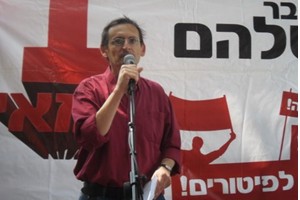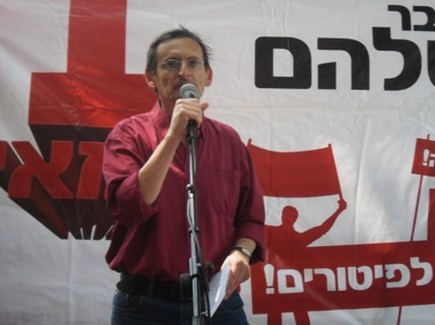
Hadash (The Democratic Front for Peace and Equality –Communist Party of Israel CPI) is among the factions that have united to form an opposition block running in the elections for the Histadrut (Federation of Labor in Israel) and Na’amat (Movement of Working Women & Volunteers) to be held on May 22.
Last week, March 27, a broad, opposition Social Front was established in the to pose an alternative to the current chairman of the Histadrut, Ofer Eini, who is formally supported by the neo-liberal and right-wing government, headed by Benjamin Netanyahu and the Labor Party. Among the parties and groups forming the new Social Front: Hadash, the Social Home Movement lead by MK Eitan Cabel (Labor dissident), Meretz, Kadima, the Otsma (Strength) Movement of MK Amir Peretz (Labor dissident) and defectors from the Likud faction.

MK Khenin during the last May Ray Rally in Tel-Aviv, May 1, 2011 (Photo: Al Ittihad)
With the signing of the agreement by the parties, it was announced that MK Cabel will be the Social Front’s candidate for the head of the Histadrut in the elections that will take place on May 22. Following the formalization of the agreement, two previous candidates running for the head of the Histadrut, MK Peretz and the Chairman of the Hadash faction in the Histadruth, Jihad ‘Aqel withdrew their candidacies.
According to the agreement: “The parties have agreed to work together with the aim of promoting values of social justice, opposition to privatization, working class solidarity, defense of all working women and men, social, civil, national and gender-based equality, and peace.”
“We have built a social coalition that will replace Ofer Eini as head of the Histadrut,” said MK Eitan Cabel. “In recent years, the Histradrut has become irrelevant for the great majority of the public in Israel. At a time when social gaps are only widening and workers cannot afford basic services, the Histadrut not only says nothing, but does nothing,” he said.
Cabel continued, “From the moment my candidacy was confirmed, I can sense a coming together of people from across a broad political spectrum, people who are eager to see a different Histadrut. Cooperation among the various parties that have formed our new Social Front is only natural: we are a large group of people who all supported last summer’s massive social protest, and who now understand that winning control of the Histadrut must be the first goal on our political agenda.”
Cabel added, “It is a choice between the old world and a new world that speaks a new language. I am convinced that, together with all the forces who have joined us, we will succeed in bringing this new world into the Histadrut, and transform this organization so that it will become, once again, the most important social and economic body in Israel. On May 22, the Histadrut will yet again be the home of the working public in Israel.”
Candidates across the country
The Social Front will put forward female and male candidates for all elected positions in the Histadrut, organized regionally throughout the country (“Workers’ Councils”), as well candidates for all elected positions in Na’amat.
Lists of the front’s candidates have been submitted for the following cities and regions: Tel-Aviv, Jerusalem, Haifa, Ashkelon, Ashdod, the Western and Central Galilee, Givatayim, the Upper Galilee, the Sharon, Holon, Kinneret, Karmiel, Lod-Ramla , the Negev, the Central Negev, Nazareth, the Southern and Northern Triangles, Netanya, Petah Tikva, Rishon le-Tzion, Rehovoth, Ramat Gan, and Hadera. Among the candidates are young women and men who have led social and class struggles in recent years, including a number of social workers who were active during last year’s lengthy strike. For the upcoming Histadrut convention, a list of approximately 2,000 delegates has been submitted, composed of members from all the front’s factions, among them the General Secretary of Hadash, Ayman Odeh.
In an interview to be published in the next edition of the CPI’s Hebrew weekly Zo HaDerech, MK Dov Khenin (Hadash) expressed satisfaction with the initiative of founding the Social Front: “This represents the uniting of all opponents to the rule of Eini in the Histadrut, who so well serves the interests of the extreme rightist government and the tycoons. This is a positive, even necessary step in the promotion of worker struggles. But this is also a political campaign. Hadash in the Histadrut is a partner in a broad-based coalition struggling, within the workers’ organization, against the representative of the rightist government.”
MK Khenin added, “We must not forget that the government ministers from the Likud are urging voters to cast their ballots for Eini. Even the Minister of Transportation, Israel Katz, who is personally promoting privatization of the railway, has publically supported voting for Eini, even though he and Eini should have ostensibly been on opposite sides of the question of privatization of the railway, against which the railway workers threatened to strike. The shameful agreement that Eini signed, just before the railway workers’ strike was about to begin, proves just how far he went towards accommodating the government and the rich ‘tycoons.’ This is an agreement that legitimizes the start of the process of privatizing the railway.”
MK Khenin continued, “Anyone who looks at the list of thousands of women and men that the Social Front has put forth as candidates for the upcoming Histadrut convention, for the local regions, and for Na’amat, will find among them Jews and Arabs, veteran activists, young people and pensioners, persons who have been involved in recent years in large public struggles, labor struggles and last summer’s social protest. We have no doubt that the Social Front’s list is, in fact, the authentic social protest list.”
For the Strengthening of Democracy and Workers’ Rights
The agreement signed by the parties to the Social Front specifically states that “after the social protest in the summer of 2011, the parties agreed to cooperate within a joint list in the elections for the Histadrut and Na’amat, with the aims of achieving employment for all who desire to work, opposing privatization, and promoting the transition from outsourcing and contract work to direct employment of workers by the places in which they work.”
The agreement also states that “in the framework of their joint activity in the Histadrut and Na’amat, the parties intend to promote the broadening and deepening of democracy in the Histadrut’s constitution, in the bylaws of the workers’ committees, and in Israeli society in general. In light of the acute hardship, poverty, and unemployment among the Arab public, the attrition of real wages paid to salaried workers throughout the society, the continual increase in the cost of living, and the ongoing attack against organized labor, the parties intend to work for equality between employees, between Jews and Arabs, between women and men, and for the strengthening of social welfare systems, public health services, public and higher education, and for improved levels of safety and hygiene in the workplace.”


